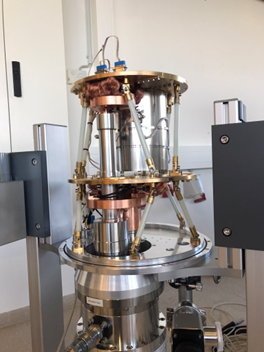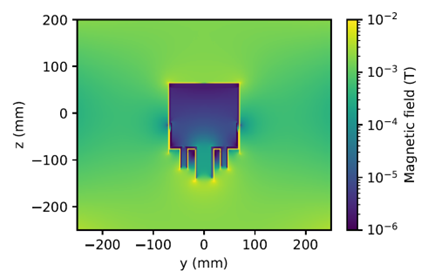Background
Creating solid-state qubits requires cooling the samples to temperatures below the thermal broadening of the qubit states. Many platforms demand temperatures even colder than the universe to safeguard the fragile qubit states from external disturbances. These disturbances not only stem from elevated temperatures at the sample1, but also from blackbody radiation from nearby shields2 and magnetic field fluctuations3, all of which significantly affect the performance of superconducting circuits. To achieve these ultra-cold and well-shielded environments, we employ cryostats that utilize various cooling mechanisms, complemented by customized shielding and wiring modifications.
In this project, you will explore the fundamentals of cryogenic transport and high-frequency measurements by working with both a wet (liquid helium) system and a customized adiabatic demagnetization refrigerator with specialized shielding. Once promising samples are identified, we will conduct a systematic study of the effects of our shielding while investigating highly promising quantum devices. For example, this setup enables us to measure spin qubits, gate-tunable Josephson junctions, as well as superconducting resonators and qubits. Based on initial results from the shielding studies, we aim to publish significant findings, potentially drawing on contributions from this work.


What you can Expect
- Deepening of solid-state physics knowledge
- Interesting measurements on state-of-the-art devices
- Operation of cryogenic setups
- Measurement techniques and electronics of quantum devices
Required Skills
- Self-motivated, independent working style
- Strong background in quantum mechanics and solid-state physics
- Affinity/experience in working with high frequency electronics
- Basic python knowledge
- Ability to communicate openly and efficiently with people of a varied background
What we offer
- Workplace, laptop for duration of the project.
- Student assistant contract via RWTH, or equivalent via FZ Jülich contract
- Young, international, dynamical workplace, located on Campus Melaten (Campus- Boulevard 79)
- Exposure to leading research activities in quantum technology
Supervision
- Dr. Vincent Mourik, FZ Jülich, PGI-11 [email protected]
- Lino Visser, FZ Jülich, PGI-11 [email protected]
References
-
Huang, J.Y., Su, R.Y., Lim, W.H. et al. High-fidelity spin qubit operation and algorithmic initialization above 1 K. Nature 627, 772–777 (2024). https://doi.org/10.1038/s41586-024-07160-2 ↩
-
R. Barends, J. Wenner, M. Lenander, Y. Chen, R. C. Bialczak, J. Kelly, E. Lucero, P. O’Malley, M. Mariantoni, D. Sank, H. Wang, T. C. White, Y. Yin, J. Zhao, A. N. Cleland, John M. Martinis, J. J. A. Baselmans; Minimizing quasiparticle generation from stray infrared light in superconducting quantum circuits. Appl. Phys. Lett. 12 September 2011; 99 (11): 113507. https://doi.org/10.1063/1.3638063 ↩
-
D. Bothner, D. Wiedmaier, B. Ferdinand, R. Kleiner, and D. Koelle, Phys. Rev. Applied 8, 034025 https://doi.org/10.1103/PhysRevApplied.8.034025 ↩